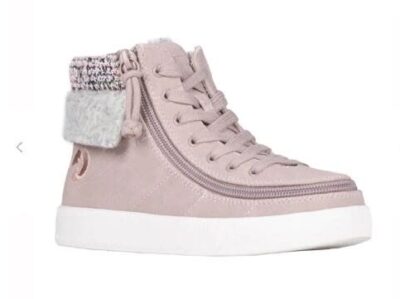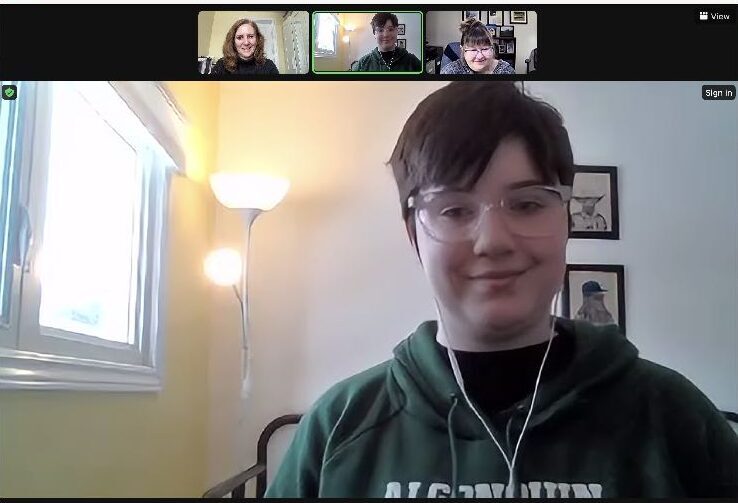The diocesan Youth Internship Program (YIP) provides participants with many different types of learning opportunities through work experience, mentorships, as well as faith formation discussions and leadership sessions. Throughout the year-long program, they also learn with and from each other. This year, Sydney Sharpe (they/them) shared their experience and perspective as a 17-year-old who lives with cerebral palsy in a discussion with fellow interns. In a follow-up interview with Crosstalk, Sid kindly shared some of the insights about disability, equity and inclusion from the YIP discussions.
Sid prefers to be described as a disabled person. “Different people have different preferences,” they explained. “My disability is central to who I am and has affected me so much that it is a part of me. It can’t really be taken out of the equation of who I am.”
Every intern has a mentor. Sid’s mentor, Chantal Huinink, who is a motivational speaker, author, social justice advocate, and an elected counsellor for the Region of Waterloo with a physical disability participated in the leadership session with the interns as well.
She added a bit more about how the language preferences about disability are changing. “In an effort to avoid labelling people with language that implies a deficit, some people prefer not to use the word ‘disability.’ In recent years however, in recognition that having a disability is not a negative thing and ‘disability’ is not a bad word, many are reclaiming it and self-identifying as, ‘disabled people.’”
Some people may prefer “people-first” language, which identifies the person’s name before the disability—Susan, who uses a wheelchair—for example. If someone is willing to disclose their disability (and different people have different levels of comfort with that) Sid suggested that it is best to ask what words they prefer in a similar way to learning what gender pronouns individuals use.
Another important point of etiquette and respect is asking a person with a disability if and how they would like help with something. Asking for consent “Can I help you? or asking what somone might want help with is very helpful, Sid said. “I’ve had some experiences where someone just helped me, and it was kind of a bad experience because I didn’t ask for it and they touched me without my consent. I’ve also heard stories about disabled people who are wheelchair users having been moved out of the way in a grocery store or a setting like that,” they explained. “So it’s just really important to ask what they need and if they can touch you and how can they help just because that … has some very vulnerable moments and it takes a lot of courage to ask for help,” she said.
Sid shared a Powerpoint slide with a quote from the World Health Organization. “Disability is … not just a health problem it is a complex phenomenon reflecting the interaction between features of a person’s body and features of the society in which he or she or they live. Overcoming the difficulties faced by people with disabilities requires interventions to remove environmental and social barriers.” …. I’d like to say that it’s not difficult being disabled, it’s difficult being disabled in a world where they don’t accommodate you,” they added.
Sid walks with a cane but explained that they use an ambulatory wheelchair at school, so that they still have energy left at the end of the day for homework and other activities.
The high school they attend does its best to accommodate, Sid said, but challenges still crop up like when the elevator was out of service for a long stretch. They attended math class virtually from the downstairs level using the Teams app for video conferencing, but it was difficult to see what was on the whiteboard and to ask questions. “My other teacher, and I love this teacher with all my heart, took the class downstairs into the cafeteria so I could be a part of the conversation.”
When a fire alarm went off, they also discovered that the safety plan to evacuate the building required stairs and didn’t work for Sid. The school came up with an alternate plan, but “it was an eye-opening experience where I realized if there was an actual emergency, the teacher wouldn’t be able to get me where I needed to go because I am a wheelchair user at school, so I can’t go down those stairs.”
Sid shared another frustration with the other interns. “It’s really hard to find fashionable clothing that I can put on myself,” they said. “I want to fit in with the fashion trends and be stylish, but a lot of those clothes have buttons [or straps or clasps] on them, which is hard with my disability…. cerebral palsy makes tasks with motor functions very difficult.”
Sid wishes more designers considered universal design, which keeps people with disabilities in mind from the beginning. “Usually, when I buy shoes, they are two sizes too big because they have to accommodate the plastic of my orthotics, but recently I have found shoes that are made for disabled people by a disabled person. They’re called Billy Shoes and they kind of zip around the orthotics or foot so that you can actually do it yourself without any help and so you just unzip the top part of the shoe, put your foot into it and zip it around.”

Both Sid and Chantal said they found the responses from the other YIP interns encouraging. “In my experience, not a lot of people want to challenge their ideas and go out of their comfort zones and take into consideration other people’s perspectives,” Sid said. “So that was just really heart-warming, and it almost brought me to tears. They were very open to seeing things from your perspective and making some changes in the way they interact with disabled people but also just educating themselves on misconceptions and issues that they might not be aware of.”
Sid was especially appreciative of Penny’s response because she works at a shoe store and wanted to increase accessibility at her job, looking at the types of shoes they offer and cleaning up areas that may be a tripping hazard.
In a separate faith formation session, the interns also talked about disability in the Bible. They discussed the story of Jesus healing a man who had been blind since birth (John 9: 1-41). The disciples ask Jesus who sinned, this man or his parents, that he was born blind?”
“Neither this man nor his parents sinned,” said Jesus, “but this happened so that the works of God might be displayed in him.”
They discussed the ways in which the community sinned in not accepting the man. Sid added that the story relates to ideas that disabled people still encounter when people say that God can heal them just as Jesus healed the blind man. “Trying to fix someone is not the best idea because [firstly] they might not want to be cured. They might be happy just being themselves but also you’re dehumanizing them.” Donna Rourke, animator of youth ministry for the diocese, added, “We’re created in God’s image. We’re God’s image bearers, every single one of us.”
Sid’s YIP work placement is with the Anglican parish of West Quebec, where they have focused on having some workshops on mental health and other issues. Next year, they plan to attend Algonquin College to study radio broadcasting and podcasting. “I chose Algonquin and Carleton in the future just because Algonquin and Carleton share a residence that is fully accessible with attendant services. Those services actually help you do daily tasks like there’s someone cutting up your food, helping you put on your orthotics, and they are the only post-secondary institutions in Canada that offer that service.”
Sid chose to study broadcasting and podcasting “because I find it so important to have that disability representation in visual and audio media and express those concerns about disability and bring awareness to the topics that are important to me.” Based on the impact among their peers in the YIP program, it looks like Sid is well on their way to that goal already.
Thoughts on inclusivity from others in the conversations:
“I strive to find ways that ensure everyone feels included in our society and social groups. Our past leadership session has proven to me how much work has to be done, and how we have so much more to learn and improve on in our communities.” – YIP intern Ainsleigh MacInnis
The speakers’ approachability and deep and discernable care made for an accessible and thought-provoking introduction to the topic. Not only did they equip us with practical guidance for making our churches more accessible, welcoming, and Spirit-filled spaces, they also introduced us to the rich and liberating invitation offered by theologies of disability: not only for those of us who are experiencing disability, but for the whole church to come to know God more fully and more deeply.” — Sarah Keeshan, Master of Divinity student at St Paul’s University and YIP faith formation leader
“It was a pleasure and an honour to be asked to design and present this session for YIP. The sharing of some of the participants’ personal experiences added a richness to the session and it is my hope that all in attendance left with a broader understanding of what inclusivity and belonging could look like as well as practical and easy suggestions for ways they can expand inclusivity in their communities, workplaces, schools and churches.” —Breanna Pizzuto, Leadership Session facilitator
To learn more about increasing inclusivity and accessibility, join online discussions:
April 25 — 12 noon to 1 pm
May 28 — 7:30 pm to 8:30 pm
Email [email protected] for more information.
Recommended Reading
My Body Is Not a Prayer Request: Disability Justice in the Church by Amy Kenny
Disability and the Church: A Vision for Diversity and Inclusion by Lamar Hardwick
Demystifying Disability by Emily Ladau
Disability Visibility by Alice Wong
Online Resource: https://opendoors.idrc.ocadu.ca/


Saint Mary’s Church, Westmeath — Deanery of the Northwest